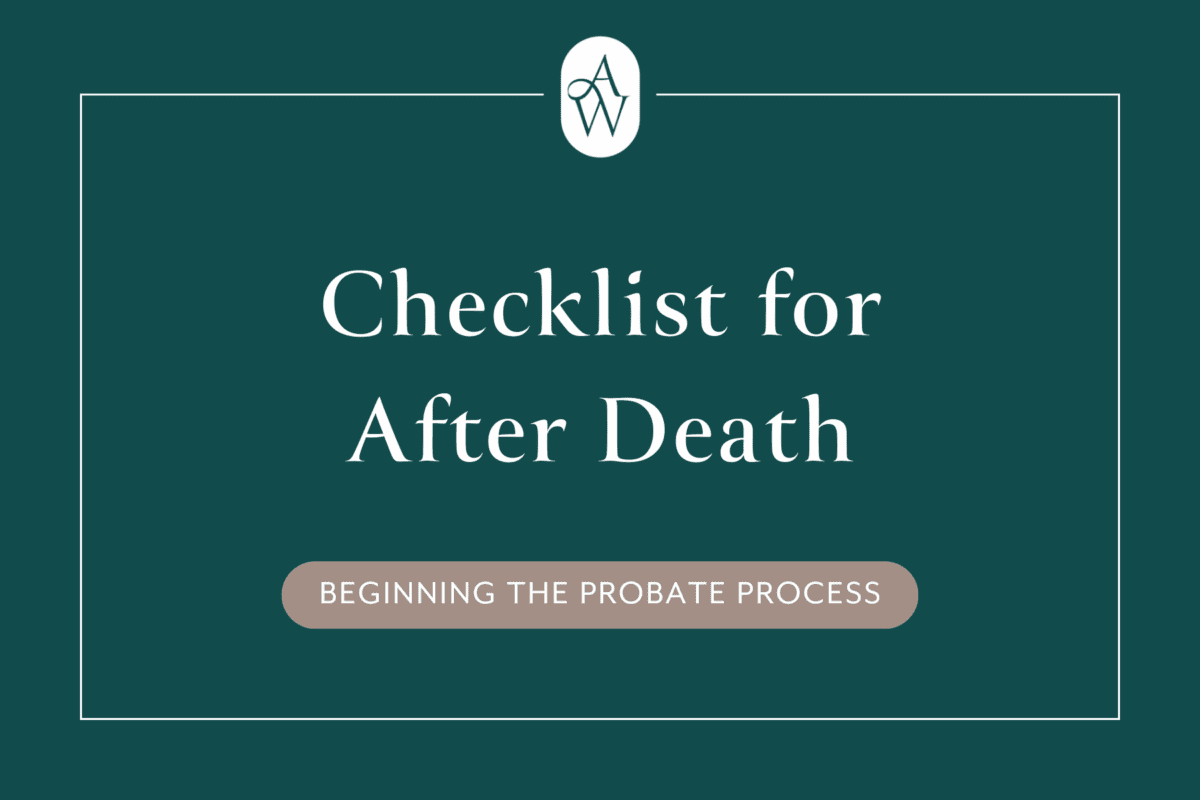
Checklist for After Death: Beginning the Probate Process
Losing a loved one is an emotional experience. It can often feel overwhelming when faced with the administrative and legal tasks that follow. One of the most important aspects of handling an estate is beginning the probate process. This checklist will provide key steps to ensure you can navigate the process smoothly, even during this difficult time.
Hi, I’m Amanda Waltz, an estate planning attorney with years of experience helping families manage the probate process. My practice is focused on providing clear, approachable guidance for individuals dealing with estate administration. Whether you’re new to probate or need assistance with more complex issues, I’m here to help you protect your loved one’s legacy and honor their wishes.
Let’s break down the key steps involved in the probate process to make this journey more manageable.
1. Obtain the Death Certificate
The death certificate is an essential document that will be needed throughout the probate process.
- Request Multiple Copies: It’s advisable to get multiple certified copies of the death certificate as many institutions, such as banks and insurance companies, will require an original.
- Identify Where to Obtain the Certificate: The funeral home or the county’s vital records office is typically where the death certificate can be requested.
- Submit to Necessary Parties: These certificates will need to be submitted to life insurance companies, Social Security, financial institutions, and other organizations as part of handling the deceased’s affairs.
2. Locate the Will
Finding the will is one of the first steps in determining how the estate will be handled.
- Check Common Locations: Wills are often kept in safety deposit boxes, filed with an attorney, or stored in a home safe. (Read more about who keeps the original copy of a will here).
- Review the Executor: The will should name the executor, the person responsible for managing the estate and ensuring that the deceased’s wishes are carried out. (Read more details about the Executor’s duties here).
- Contact the Attorney: If the deceased worked with an attorney, they may have a copy of the will and can assist with the probate process.
3. File the Will with Probate Court
The will must be filed with the local probate court to officially start the process.
- Identify the Right Court: Probate must typically be filed in the county where the deceased resided.
- Submit the Will: The executor or an attorney can file the original will with the probate court, along with the necessary paperwork to begin the process.
- Pay Filing Fees: There may be a filing fee that varies by state or county.
The Franklin County Probate Court’s website offers valuable resources for those researching estate administration. For further information on common questions, I recommend checking out their “Estate Administration Pamphlet,” which can be accessed here.
4. Inventory the Assets
Once probate is initiated, an inventory of all the deceased’s assets must be created.
- Gather Financial Statements: Bank accounts, investments, real estate deeds, and other financial documents should be collected.
- Assess Real Estate and Valuables: Include any property, cars, or valuable personal items in the inventory.
- Review Debts and Liabilities: The estate’s debts, including credit cards and mortgages, must also be listed in the inventory.
5. Notify Beneficiaries
During the probate process, beneficiaries of the estate must be informed.
- Reach Out to Beneficiaries: The executor is responsible for notifying the beneficiaries named in the will.
- Respond to Claims and Disputes: Any claims made by creditors or disputes among beneficiaries will need to be addressed as part of the probate process.
Managing probate after the loss of a loved one can feel overwhelming. By following a checklist and staying organized, the process can be less stressful. Remember, each step of probate is meant to ensure that the estate is distributed following the deceased’s wishes. Having an experienced attorney by your side can offer guidance and peace of mind.
If you are in the early stages of probate or are unsure of where to start, reach out to me, Amanda Waltz, for professional support and advice. I am here to help you through every step, ensuring that your loved one’s estate is handled properly and efficiently.
